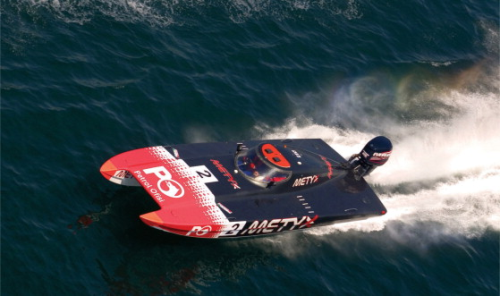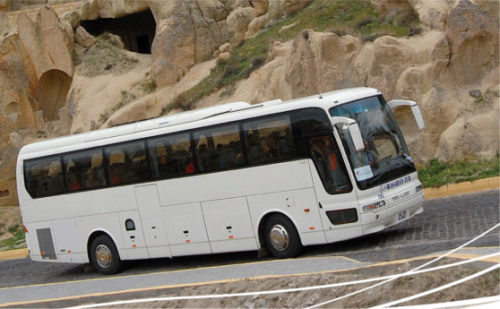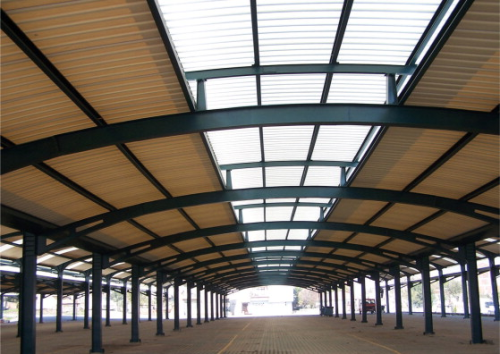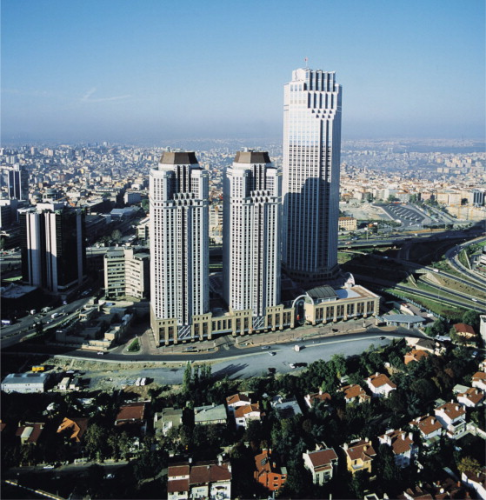



Although still a comparatively small market, Turkey is one of the best emerging markets for composites in Europe. The Turkish glass reinforced plastics (GRP) market has been growing by around 10% in a year. The current per capita consumption of glass fibre in the country is 0.38 kg/year; the average value for Europe is 1.0-1.5 kg/year. Production still relies heavily on open moulding, but with accelerating foreign investment capital coming in, new production techniques are gaining ground.
In the thermoplastics sector, Turkey's own domestic demand and exports to Europe are increasing significantly. New companies have come in to the market and foreign compounders are also evaluating the possibilities of investing in Turkey, with a local partner or on their own.
Another sector where big growth is expected to be achieved is roof and truck GRP sandwich panels. Building and infrastructure activities are also increasing, leading to good prospects for pipe manufacturing for water and sewage applications.
Cam Elyaf
Founded in 1971 as a subsidiary company of the Sisecam Group, Cam Elyaf manufactures E-glass fibre and related products. It also produces unsaturated polyester resins, gel-coats and pigment pastes. Today, the company employs around 730 people and produces 66 000 tons of glass fibre and 30 000 tons of unsaturated polyester resin a year. Cam Elyaf is one of the few manufacturers of both glass fibre and polyester resin in the world.
Cam Elyaf's head office and production premises are in Kocaeli, Turkey. Around 65% of its production is exported. The company is active in Europe, the USA, South America, North Africa and the Middle East. It recorded sales of around US$120 million in 2006.
Cam Elyaf's glass fibre products include chopped strand mats, rovings, chopped strands, woven rovings, and combinations of these. It supplies customers in the construction, automotive, electronics, infrastructure, ship building, sport/leisure, household appliances, aircraft and energy sectors. Multiaxial fabrics manufacturer Saertex and sheet moulding compound (SMC) producer Polynt are two of its well known customers in Europe.
In order to meet requirements for new applications and higher performance, the company has diversified its product range with a new single-end roving, WR5, and in addition to the existing ‘powder chopped strand mat’ production, a line for emulsion-bonded mat EMAT1 for open moulding applications started operations in 2006. Roving WR6 is designed for weaving and knitted or needled glass fabrics. WR5 is being used by weavers of multiaxial and woven reinforcement products and is recommended for marine, building and industrial applications. Its silane-based sizing means it is compatible with polyester, vinyl ester and epoxy resins. Other products which have been developed for specific customer requirements include chopped strand for hydrolytic resistant thermoplastic industries and a roving for Class A SMC.
The company is also expanding its polyester resin range. The latest product is an acrylic modified orthophthalic binder resin (CE 75 M) designed for production of quartz-based composite 'stone' (polymer concrete).
Cam Elyaf started production of unsaturated polyester resin in 1980 under a technical agreement with SAVID (NEOXIL) of Italy. It had an initial capacity of 7000 tons per year. In 1998 capacity was increased with a new reactor to reach 19 000 tons. Following the installation of another new reactor in 2003, annual capacity is now 25 000 tons per year. Products include orthophthalic and isophthalic resins for general purpose GRP applications, casting, panel production, SMC/BMC, acrylic backing applications, pultrusion and pipe manufacturing.
Cam Elyaf has a strong R&D capability. It has developed 14 new glass fibre products and nine new polyester products since 2005. It sells its products directly to customers as well as through distributors.
Strategy for growth
In line with growth in the composites industry, Cam Elyaf's goal is to diversify its product range and customer portfolio. It also plans to strengthen its leadership in the Turkish GRP sector and in other regions of the world by following its customers' projects closely and better understanding their requirements for reinforcement materials and resins.
Cam Elyaf pioneered the establishment of a GRP Manufacturers Association in Turkey in 2005, which later became a member of the American Composites Manufacturers Association (ACMA). Its mission is to foster the use of GRP in every aspect of life, to conduct activities promoting its application, sharing of information, standardisation and development on a scientific basis for the benefit of government and local authorities, users, manufacturers and scientific institutions.
One of the biggest challenges facing Cam Elyaf's business at present is the continual price increases for the raw materials used in polyester resin. The increasing costs for GRP products may result in increasing demand for other materials. A further challenge is increasing competition in the market, particularly the low cost production of Chinese manufacturers. Thirdly, Turkey is still a high inflation market and it takes expertise to run a company in such an environment.
The Sisecam Group is a leading Turkish manufacturer primarily involved in the production of glass and chemicals. It specialises in all types of basic glass products such as flat glass, glassware, glass packaging and glass fibre as well as sodium and chromium chemicals. Sisecam is owned by the largest private bank of Turkey, ISBANK, which is one of the largest banking groups in Europe. The group has operations in Turkey, Egypt, Bulgaria, Russia, China, Bosnia Herzegovina, Georgia, and Italy. Today, Sisecam is one of the top 10 glass manufacturers in the world in terms of the size of its operations. In 2006, it had net sales of almost US$2.0 billion, an increase of 17% over 2005, and produced 2.5 million tons of glass. Sisecam has been traded on the Istanbul Stock Exchange since the early 1970s. |
The company also sees opportunities. With increasing capabilities of developing new products, Cam Elyaf can more quickly respond to the market's new product requirements. The company's unique location in Turkey provides good opportunities to access the fast developing countries of Azerbaijan, Kazakhstan, Kyrgyzstan and others. Turkey shares the same language with these countries. It is also a big advantage to be close to the Middle East where demand for GRP is increasing rapidly.


